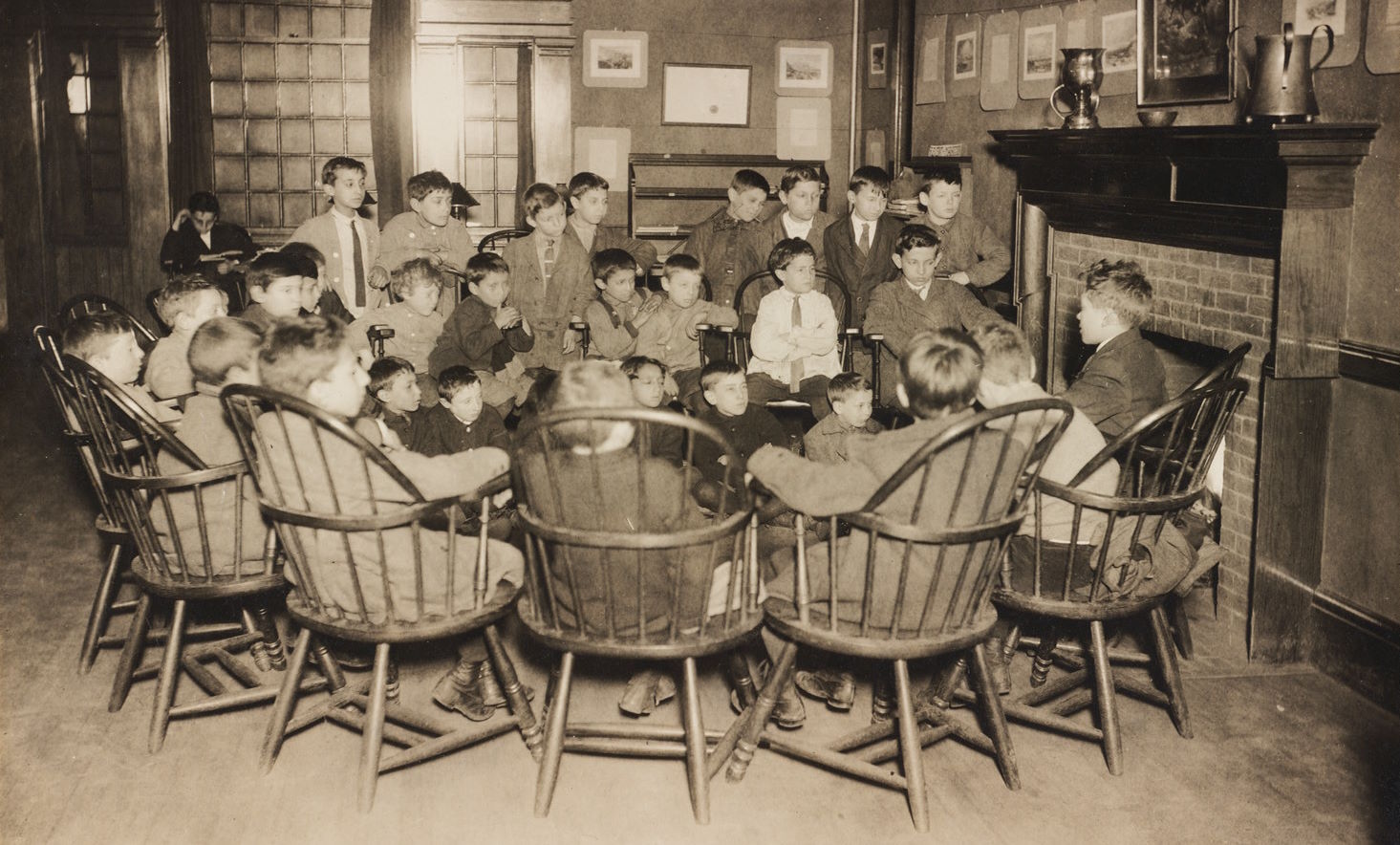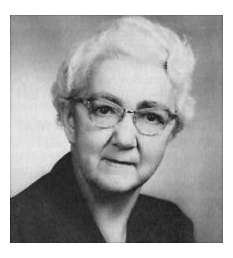 Grace Coyle and group work. Grace Coyle made an extraordinary contribution to our understanding of group work. She was also an important advocate for the work within US social work and an innovatory trainer.
Grace Coyle and group work. Grace Coyle made an extraordinary contribution to our understanding of group work. She was also an important advocate for the work within US social work and an innovatory trainer.
Contents: introduction · on group work · conclusion · bibliography · how to cite this article.
Photograph of Lincoln House Boys Club 1912 – Boston Public Library, flickr | ccbyncnd2; photograph of Grace Coyle – Public Domain.
Grace Longwell Coyle (1892-1962) made a profound impact on the development of thinking about, and the practice of, group work. Her books were landmark contributions to the field and she made a significant contribution to the development of teaching about group work
Grace Coyle was born in North Adams, Massachusetts. She received her bachelor’s degree in 1914 from Wells Lake College, and a certificate from the New York School of Philanthropy 1915. She gained a master’s degree in economics in 1928 and a doctoral degree in sociology from Columbia University in 1931.
She worked in settlement houses for several years (both with children and adults), but it was her activities within the YWCA (in the Industrial Women’s Department) where she was responsible for adult education and recreation that provided her with a platform for her exploration of group work. From 1934 to 1962 she taught at the School of Applied Social Sciences at Western Reserve University in Cleveland. She had already developed one of the first group work courses there in 1923. Grace Coyle became president of the National Conference of Social Work in 1940, the president of the American Association of Social Workers in 1942 and the Council on Social Work Education from 1958 to 1960 (details from NASW 2003). Her books include Social Process in Organized Groups (1930), Studies in Group Behavior (1937), Group Experiences and Democratic Values (1947), Group Work with American Youth (1948), and Social Science in the Professional Education of Social Workers (1958).
On group work
Grace Coyle’s initial formulation of group process in her PhD dissertation and in Social Process in Organized Groups (1930) drew significantly on Dewey and writers like MacIver and Laski. Although there had been previous discussions and explorations in the area (e.g. Lindeman 1924) her book, in many respects, set the scene for the examination and development of group work in the United States during the 1930s. It reviewed and examined the organized group in its social setting; the process of group formation; the determination of membership; the evolution of structure; the functions of leadership; the process of communication; the development of esprit de corps; the process of collective thinking; and some functions of the organized group. Her focus was on organized life – the associations ‘of every variety’ that ‘arise and gather together individuals from the milieu that comes within the range of their activity’. Such associations, she continued, ‘form themselves into a more or less stable pattern of relationships with certain processes and functions in time, perhaps, dissolve again into the surrounding sea of the community’ (Coyle 1930: 3). Her study of organized groups highlighted some of the key points at which interventions could be made to improve functioning and to make processes and outcomes more satisfying to members – however, it is not a study of group work as such.
By the mid 1930s, there appears to have been a growing discourse in the United States around the notion of social group work – with Grace Coyle being a significant participant. The 1935 National Conference of Social Work was the first to have papers specifically on group work. For example W. I. Newstetter gave a paper ‘What is social group work?’; Neva Boyd gave an influential paper on ‘Group work experiments in state institutions in Illinois’; and Coyle herself discussed ‘Group work and social change’ (Reid 1981: 126-30). At the conference Grace Coyle received the Pugsley Award in respect of her paper (it is reprinted in Coyle 1947).
In Studies in Group Behavior (1937), Grace Coyle brought together five detailed and illuminating case studies of work with groups from records written by students in the School of Applied Social Sciences, Western Reserve University. It was assembled in the hope that it would contribute to ‘a critical analysis of group leadership generally and an improvement in the quality of such leadership’ (Coyle 1937: vii). They all derived from an informal education context: the groups were all organized as clubs, four were what might be called ‘natural groups’ (which she defined as ‘small, congenial groups of children or young people based on a gang impulse rather than united around some single common interest’ ibid.: viii). She outlined three, key objectives that govern the efforts of group leaders:
- Such groups provide… an opportunity for developing social attitudes and the ability to adjust to others in mutually enriching ways. Here in the club is a school in human relationships….
- Secondly, in addition to such experience in social adjustment to one’s fellows these groups provide opportunity for the development of new interests, the broadening of knowledge and the acquiring of new skills. Like the proressive educator, the group worker must begin with existing interests, but building upon them he may, if he has the skill, lead his group into enriching new experiences, into higher degrees of useful skills, into new realms of knowledge, or into the wider ranges of social responsibility.
- In the third place, the group can provide training and experience in community living and in active participation in community affairs. These groups exist within a network of social relationships… As the members mature they must find their way into this intricate web of the community. These groups within a social agency afford an opportunity for them to learn cooperative effort for common ends. (Coyle 1937: 1-2)
Within this framework she was able to examine the relation of group and leader; the relationship of the leader to individuals; the handling of social interactions; problems of group control; programme construction; the handling of group feeling; and the relationship of the group to the community.
Grace Coyle remained a strong advocate of group work’s contribution to the nurturing of democratic life (see, in particular, Group Experiences and Democratic Values 1947), however, the context in which she was operating was shifting. As Kenneth Reid (1981) notes, there had been a separation of group work and recreation. There was a movement away from what might be called an informal education frame of reference and a location more strongly within social work (and as a result took in many of the concerns of casework, for example, with regard to improvements in individual functioning rather than what we have come to know as social capital). By 1947 she was recognizing the roots of group work in informal education and recreation but arguing that it had moved beyond its boundaries. She argued for an expanded appreciation of the nature of social work and for group work as a method within it (Reid 1981: 160).
Group Work with American Youth (1948) proved to be an influential text within youth work. It was the first of Grace Coyle’s books to find a small, but significant audience in Britain, and was picked up by many within North American youth organizations and settlements. The approach bears the marks of the movement from informal education to social work. The group worker was presented as a problem-solver. Drawing upon an appreciation of the insights afforded by psychology and sociology she or he could work with members to deal with both their personal and group problems. She was also able to draw upon the growing body of small group research to explore implications for the leadership, processes and structures of groups, and for the roles within them.
Conclusion
The citation in the National Association of Social Workers listing of social work pioneers reads as follows:
All of her writings and speeches are institutes contributed to the acceptance of group work as a social work method. Grace Coyle felt that case work and group work had a common philosophy and that both would be enriched by their integration. She felt that the uniting of the two would result in better quality services for the client. She argued that group workers need to become more aware of personality issues and family relationships, while at the same time case workers need to be more knowledgeable of group dynamics and the use of leisure activity. It was also her belief that a better acquaintance with case work by group workers would reveal the therapeutic possibilities of a group experience.
Coyle’s great early contribution was to lay bear some of the key processes and elements in associational life thus allowing us to develop thinking and practice around points of intervention. She pioneered group work training and was a key figure in the emergence of group work as professional form.
Bibliography
Coyle, G. L. (1930) Social Process in Organized Groups, New York: Richard R. Smith. [Available in the Internet Archive].
Coyle, G. L. (ed.) (1937) Studies in Group Behavior, New York: Harper and Brothers. [Available in the Internet Archive].
Coyle, G. L. (1947) Group Experience and Democratic Values, New York: Women’s Press. [Available in the Internet Archive].
Coyle, G. L. (1948) Group Work and American Youth. A guide to the practice of leadership, New York: Harper and Brothers. [Available in the Internet Archive].
Lindeman, E. C. (1924) Social Discovery. An approach to the study of functional groups, New York: Republic Publishing.
National Association of Social Workers (2003) ‘Grace Coyle’ in Social Work Pioneers, http://www.naswfoundation.org/pioneers/c/coyle.htm. Accessed December 12, 2003.
Reid, K. E. (1981) From Character Building to Social Treatment. The history of the use of groups in social work, Westport, Connecticut: Greenwood Press.
Photograph of Lincoln House Boys Club 1912 – Boston Public Library, flickr | ccbyncnd2.
How to cite this article: Smith, M. K. (2004) ‘Grace Coyle and group work, The encyclopedia of pedagogy and informal education, www.infed.org/mobi/grace-coyle-and-group-work/.
© Mark K. Smith 2004, 2024

 Grace Coyle and group work. Grace Coyle made an extraordinary contribution to our understanding of group work. She was also an important advocate for the work within US social work and an innovatory trainer.
Grace Coyle and group work. Grace Coyle made an extraordinary contribution to our understanding of group work. She was also an important advocate for the work within US social work and an innovatory trainer.